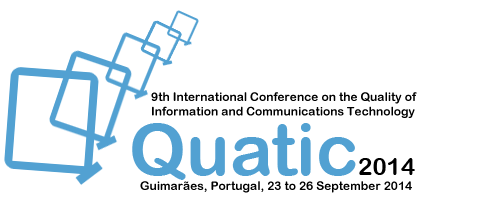Foreword by the ChairMaria Lencastre (UPE, Brazil)Quality is often considered something that must be in conformance to system requirements. However, the latter keeps changing to guarantee business alignment, thus making quality a moving target! Requirements engineering helps stakeholders to elicit their expectancies with respect to systems, to prioritize such expectancies and, ultimately, to reach a common ground with other stakeholders with conflicting requirements. Furthermore, it helps stakeholders from different backgrounds to communicate among them, and with the systems developers. The former are not necessarily interested in the technical details of the implementation of the systems, while the latter are specialized in building systems, rather than on the specific applications of the systems they build. Caught in-between, requirements engineers must also keep up with newer development approaches such as Software Product Lines (SPL), Model Driven Development (MDD), Service Oriented Architectures (SOA). The Quality in ICT Requirements Engineering Thematic Track 2014 has at its final program papers which consider the topics: requirements elicitation, quality models, requirements specification and formalization, and requirements specification tools. The program includes 2 accepted full papers and two works in progress. The paper entitled “An Experiment of Software Quality Evaluation in the Audio-visual Media Preservation Context”, written by researchers from Istituto di Scienza e Tecnologie dell’Informazione (Pisa, Italy), proposes a software quality model customizable for the audio-visual context; it also includes an experiment developed for the identification of some functional and non-functional requirements, and their mapping on some characteristics of the quality model; some customized software measurement plans have been implemented. Another paper is entitled “Towards a System Requirements Specification Template that Minimizes Combinatorial Efects”. It was written by authors from Portugal (IST/Universidade de Lisboa and INESC-ID Lisboa) together with their colleagues from Belgium (University of Antwerp & Normalized Systems Instiute Antwerp). The paper introduces the problem of combinatorial effects based on the evidence of many dependencies that exist among the elements commonly used on system requirements specification (SRS). The authors start from the analysis and comparison of the popular SRS templates, mainly from the perspective of the constructs and models involved. Then they propose and discuss a set of practical recommen-dations to help defining a SRS template that may better prevent (to some extent) the referred problem. The two works in progress accepted in the track include a paper which comes from north of Portugal (University of Minho & HASLAB / INESC TEC Braga) and is entitled “A study on the viability of formalizing Use Cases”; this paper addresses the transformation of use case descriptions expressed in a Controller Natural Language into an ontology expressed in the Web Ontology Language (OWL), as well as the query process for such information. It reports on a study aimed at validating our approach and our tool with real users. A preliminary set of results is discussed. The second work in progress, was written by colleagues from the Faculty of Organizational Science (Belgrade, Serbia) together with the Universidade de Lisboa (Portugal), and is entitled Preliminary experience using JetBrains MPS to implement a requirements specification language. The paper considers that the integration of use cases within the Model Driven development paradigm requires a rigorous definition of the use case specification; the authors describe the key part of SilabReq language for requirements specification based on use case, and present the main result from their preliminary experience with implementation of the SilabReq language with Meta Programming System. Track CommitteeChair: Maria Lencastre, University Pernambuco, Brazil Local Co-Organizing Chair: Fernando Wanderley, FCT-UNL, Portugal Program Committee:
Call for Papers
Quality is often seen as conformance to requirements. However, the latter keep on changing on ICT systems to guarantee business alignment, thus making quality a moving target! Requirements engineering helps stakeholders to elicit their expectancies with respect to ICT systems, to prioritize such expectancies and, ultimately, to reach a common ground with other stakeholders with conflicting requirements. Furthermore, it helps stakeholders from different backgrounds to communicate among them, and with the systems developers. The former are not necessarily interested in the technical details of the implementation of the systems, while the latter are specialized in building systems, rather than on the specific applications of the systems they build. Caught in-between, requirements engineers must also keep up with newer development approaches such as Software Product Lines (SPL), Model Driven Development (MDD), Service Oriented Architectures (SOA) or Aspect Oriented Software Development (AOSD). We seek novel contributions on how to leverage ICT systems quality with requirements engineering techniques, as well as case studies reporting how requirements engineering is setting the stage for quality, both at development and run-time. Suggested topics of interest include, but are not restricted to:
Paper submissionAuthors should submit to http://www.easychair.org/conferences/?conf=quatic2014 a PDF version of their paper. Papers must be in CPS format and not exceed 6 pages, including figures, references, and appendices. Submissions must be original and will be reviewed by the Track Program Committee. Accepted papers will be be submitted for archiving in Xplore and CSDL, subject to one of the authors registering for the conference. The authors of the 3 best papers of this thematic track will be invited to submit extended versions to the main track of the conference. More info on the QUATIC’2014 selection process and its tracks can be found at http://2014.quatic.org. Important dates |
Tracks > Thematic tracks >












